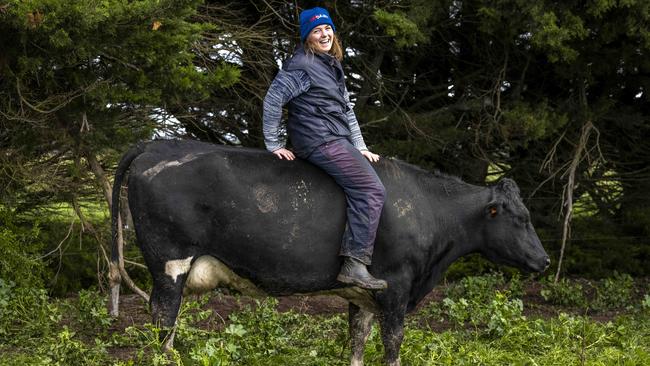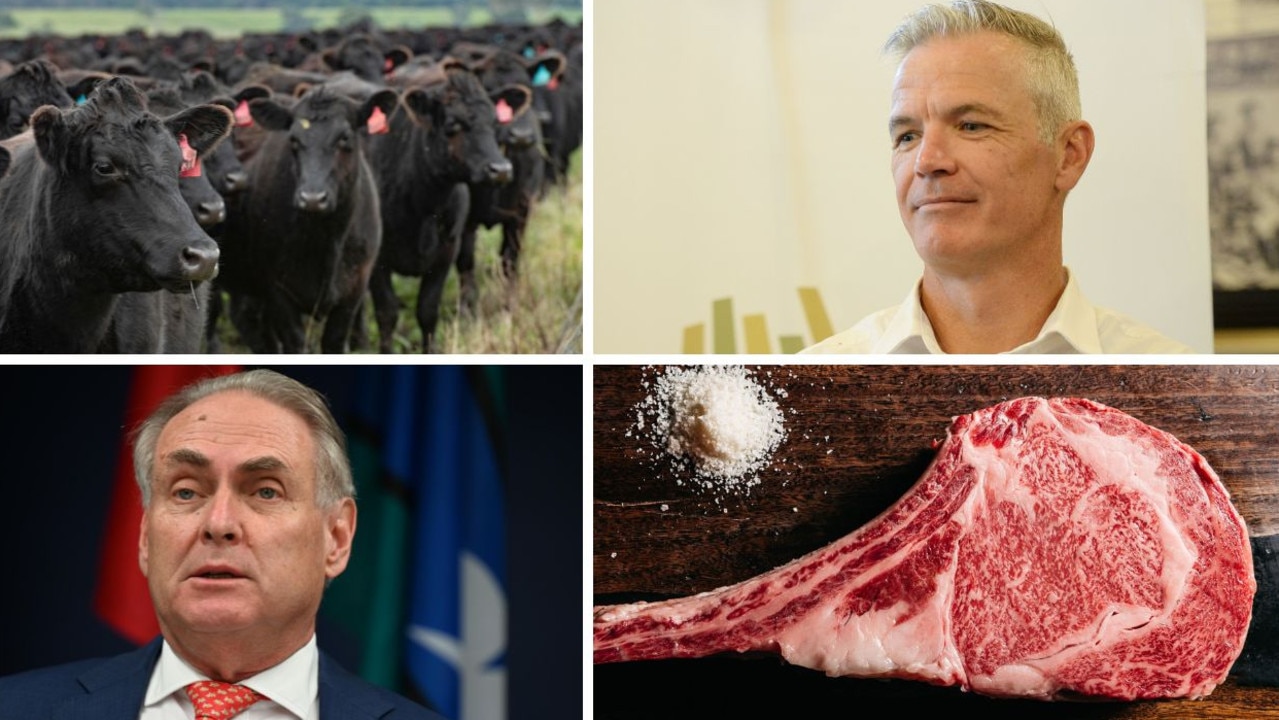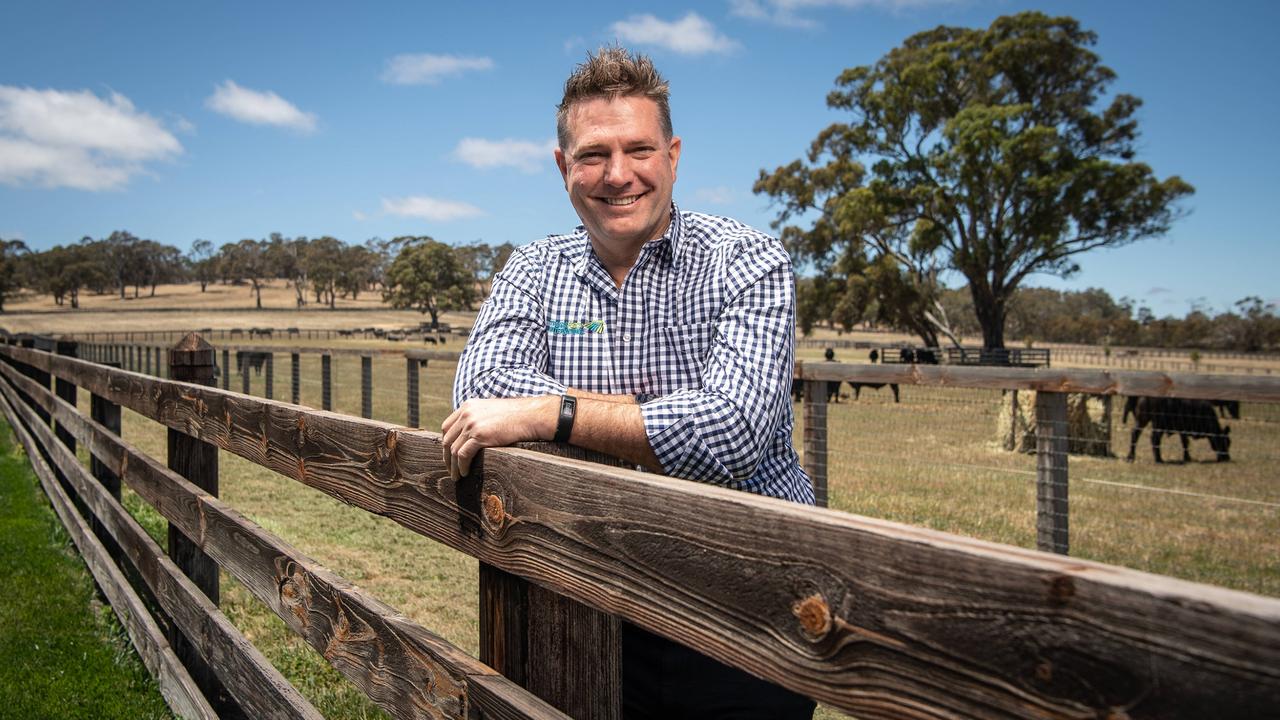Vet, scholar, farmer, Lucy lives through ethical practice
Lucy Collins has a number of titles; veterinarian, Nuffield Scholar, dairy medicine student, and dairy farmer. She tells us how and why she does it all.

Agribusiness
Don't miss out on the headlines from Agribusiness. Followed categories will be added to My News.
Lucy Collins has a gumboot on both sides of the farming fence.
And she wouldn’t have it any other way.
The 32-year-old has a number of titles; veterinarian, Nuffield Scholar, dairy medicine student, and dairy farmer.
But whether she’s treating animals in the clinic, working on the farm, or studying, central to it all is one idea: preserving and promoting high standards of animal welfare.
On the Dixie Park farm at Dixie, in southwest Victoria, Lucy works alongside her partner Matthew Glennen, a third-generation family farmer.
His parents, John and Helen, are still very involved in the daily operations of the farm, Lucy says, and she has the joy of being able to deploy her veterinary skills while working alongside them.
It’s a dream come true for the woman who always dreamt of working on a farm.
“The plan was always to do something with livestock,” Lucy says.
Her connection to dairying started when she was little, growing up in South Gippsland, with agricultural contractors for parents.
“I grew up on other people’s farms,” Lucy says.
“I grew up working for the neighbouring property, rearing their calves, and doing a bit of milking.
“That’s where I grew interested in dairy in particular.
“I’ve always had a strong affinity for animals, and a particular interest in livestock.
“The fact I didn’t have a family farm meant I thought being a vet would be a great way to get on-farm in a meaningful way.
“I really love farmers, I love what they do, and I love being outdoors,” Lucy says.
“Both sides of my life marry together quite nicely.”
WELL SET UP
Dixie Park’s main operation is dairying, running about 650 milking cows across the 300ha home block, with a stocking rate of 2.2 cows per milking hectare.
“It’s a Holstein herd, moving towards a crossbred herd,” Lucy says.
A second 180ha block down the road houses young stock, with a growing dairy beef component to the business, to capitalise on dairy beef and export markets.
The farm is able to irrigate about 120 hectares using hard hose and 50 megalitres of underground irrigation licence via a 35-megalitre effluent dam.
Soils are a mixture of black clays near the creeks, rising to a clay loam.
“It’s coming in a bit wet now, and we had a reasonably dry autumn.
“We’re well set up over here, over the year Matt and his parents put a lot of focus on subsurface drainage across the farm,” Lucy says.
“Things are well set up to manage the wet conditions over a winter such as what we’re having.
“We have plenty of reserved fodder, we’re in a nice position.”
Pastures are mainly base perennial ryegrass.
“Matt is phenomenal at growing grass, the man can grow grass,” Lucy says.
“We haven't finalised last year’s Dairy Base data yet but we’re looking like around 9-10 tonnes used pasture per hectare.”
The family milks twice a day, via a 55-unit rotary.
Last year the cows averaged about 590kg of milk solids.
There are about four full-time equivalents working on the farm.
A key part of the farm’s strategy for the future is remaining an employer for workers, as well as being sustainable in caring for animals and the land.
“That’s a big part of it,” Lucy says.
learning PROCESS
Running a dairy operation is a full time endeavour in itself.
Yet Lucy finds time to work as a senior vet in Timboon, while writing her thesis on welfare in the Australian dairy industry as part of her Masters in Veterinary science.
A Nuffield Scholar for 2021, her focus is on public perceptions and welfare enhancement in the Australian dairy industry.
“It beautifully complements everything I’m trying to do here on the farm,” Lucy says.
“I’d like to think I’ve helped facilitate change (on farm) rather than dictated it.
“We’ve had some really robust discussions at times, but it’s constantly a learning process. And we recognise the need to be adaptable and progressive.”
Lucy has a list of practices at Dixie Park the family are particularly proud of.
“We keep records of all our treatments.
“We’ve seen a huge change in pain relief management,” Lucy says.
“We do reproductive checks three weeks after calving, and check for signs of illness.”
Milk culturing, selective and strategic dry cow antibiotic usage, an increased focus on crossbreeding with particular focus on health traits, humane euthanasia training, early pregnancy diagnosis, and in-line milk meters are just part of the suite of measures the farm follows.
Lucy says the family are working towards regular lameness and locomotion herd scoring, regular herd body condition scoring, and a move to cow collars to allow collection of rumination and health data to detect sick cows sooner.
“Moving forward, we’re looking at becoming a bobby calf-free farm,” Lucy says.
“It’s moving with the times.”
The food trail, which spreads the length of the Great Ocean Road, has worked to raise consumer awareness of food traceability.
DRIVING FORWARD
And while Dixie Park, which supplies Bulla, is not a niche, boutique dairy, it still operates within a commercial space.
“There’s mounting pressure from the community, an increasing awareness of animals as being sentient beings, and that duty of care we have for them,” Lucy says.
“It’s a consideration on our minds. It would be nice for the industry to drive forward in the space of high welfare, quality milk.
“It’s also about being ethically OK with what we’re doing on farm here.
“We’re making an income and a profit from these animals, but in line with our ethics.
“I don’t think it’s a new concept, but the conversation around how care drives production … more recently that conversation has changed.”
It’s not all work and no play for Lucy.
In fact, simply being on farm, or spending her days caring for animals, is an important part of Lucy’s happiness.
And she thinks it’s important to promote the joys of farming and veterinary science.
“It’s about reminding ourselves of the enjoyment factor, and being real,” Lucy says.
Farming is central to everything she does.
Her upcoming wedding was planned on the proviso it worked around calving on the farm. She even bought her partner a cow brush for his birthday last year.
“There’s research that things like that do improve welfare.
“I’m not sure if one brush is going to work.
“But that’s the human enjoyment too,” Lucy says.
MORE
FOREIGNERS MUSCLE IN ON AUSTRALIA’S BEEFA SSETS
REVEALED: APPLICATIONS TO REZONE FARMLAND FOR HOUSING
BANK AUSTRALIA: CALLS FOR LICENCE TO BE REVOKED
Originally published as Vet, scholar, farmer, Lucy lives through ethical practice



